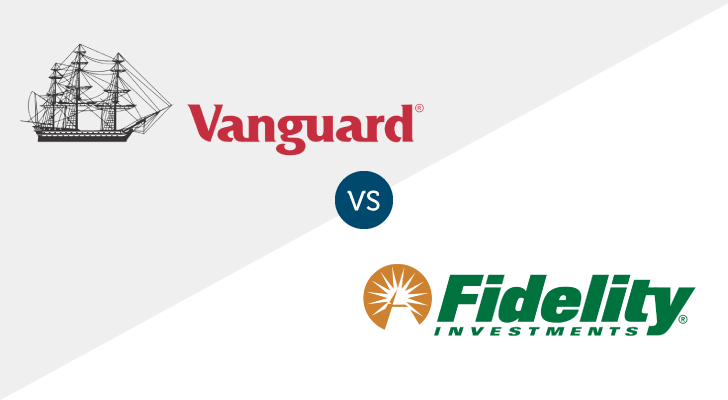Vanguard vs. Fidelity: Which Brokerage is Best?
If you’re looking for a platform for investing, you may consider two of the largest brokerage firms, Vanguard and Fidelity. Each offers plenty of low-cost funds, brokerage and retirement savings accounts, third party...Thursday, February 20th 2020, 12:07 pm

If you’re looking for a platform for investing, you may consider two of the largest brokerage firms, Vanguard and Fidelity. Each offers plenty of low-cost funds, brokerage and retirement savings accounts, third party financial products and mobile app offerings. To help you compare these investment giants we have a detailed breakdown of their differences and similarities. This information will help you decide which one is best for you.
Each Brokerage’s Priority
Vanguard, which has long stressed the value of low-cost investing, tends to focus on long-term investing, such as opening a retirement savings account or a brokerage account that can help investors build funds for a rainy day. Generally, Vanguard doesn’t appear to go aggressively after active traders or investors with short-term investing objectives. The brokerage also doesn’t offer leveraged ETFs or inverse funds and exchanged-traded notes, which it deems unsuitable for the long-term goals of its investors.
On the other hand, Fidelity pursues a broader focus, one that includes retail investors as well as sophisticated traders. This also includes the kinds of index investors that have traditionally worked with Vanguard, and in recent years the firm has been courting these investors with low-cost index funds that compete with Vanguard’s offerings.
Fidelity aims to help their clients no matter what stage of investing they are in. From beginner investors learning how to trade to private wealth managers, Fidelity strives to be a one-stop shop.
Fees and CostsVanguard and Fidelity both provide access to thousands of third-party mutual funds and ETFs as well as low-cost financial products. Vanguard’s funds lower the expenses that ETFs charge to around 0.07%, which equates to about $7 per $10,000 invested. With actively traded funds, investors may see expense ratios as high as 0.19%. Fidelity mutual fund costs can vary but often have expense ratios as low as 0.15% for index funds.
Fidelity dropped commissions last fall for online equity, options and ETF trades in its retail accounts, eliminating a $4.95 charge for such trades. However, it does charge a $0.65 fee per options contract, and other fees are assessed for options trading.
Vanguard has traditionally had higher fees for trading, in keeping with its focus on long-term, buy-and-hold investing. However, it followed the other major brokerages by eliminating trading fees in January 2020. With options, expect to pay $1 per contract, though if you have a larger account Vanguard may waive this for your first 25 to 100 options trades.
In regard to account inactivity fees, Vanguard charges a $20 annual fee for brokerages and IRA accounts while Fidelity doesn’t charge anything. But if you sign up for e-statements or have over $10,000 invested in Vanguard funds, they may waive your fee.
Investment OptionsBoth Fidelity and Vanguard have a wide variety of low-cost mutual funds and ETFs. If you’re simply looking at the options offered by each firm, Fidelity has more options available. Vanguard has about 2,800 no-transaction-fee mutual funds and 1,800 commission-free ETFs, while Fidelity offers over 3,700 no-transaction-fee mutual funds.
However, when it comes to index funds, Vanguard offers the lowest expense ratio of any fund company on the market. Since Vanguard is essentially owned by its funds, which are then owned by the investors who hold the funds, expenses are minimized. However, many firms are trying to compete with Vanguard’s low-cost funds. Therefore, you may be able to find other firms who have lower expense ratios. In fact, depending on the funds you want to invest in, Fidelity may have funds with lower expense ratios.
Additionally, Fidelity has $0 account minimums and has several funds that have no minimums as well. While Vanguard also has a $0 account minimum the company often has fund minimums starting at $1,000 to $3,000 depending on the fund. Vanguard does not waive their minimums, even if you’re a repeat investor. But Vanguard may lower the minimums depending on the type of account that holds the funds, such as an educational savings account.
When it comes to investment options, both firms have offerings that may be suitable for your portfolio. If you’re unsure which firm has funds that meet your budget and investment objectives, you can compare funds by using each broker’s fund screener.
Robo-Advisor and Education ServicesFidelity and Vanguard both offer robo-advisor services, educational tools and mobile apps to help you better manage your money. However, for those who want to actively trade, Fidelity offers Active Trader Pro. This service helps investors stream data and customize charting. Vanguard doesn’t have a similar service.
For people who want investment advice, Vanguard has a hybrid robo-advisor service known as Vanguard Personal Advisor Services. With over $50 billion in assets under management, this service has algorithms that help with portfolio construction. They also offer human advisors via phone or online who can help answer financial planning questions and concerns such as the best way to save for retirement. Vanguard requires a $50,000 account minimum for this service and charges a 0.30% annual management fee. If you have over $500,000 you will receive your own personal financial advisor.
Fidelity also offers a robo-advisor service known as Fidelity Go. This platform is best for self-directed investors but also has brick-and-mortar locations where clients can find answers to some basic financial planning questions. If you don’t have a location in close proximity, you can also reach out to one of their call centers. If you want a dedicated financial advisor, this service costs 0.35% annually.
Both platforms also offer a wide variety of retirement planning content, tools and resources to help with all of your financial planning concerns.
The Bottom LineIf you want to actively trade within your accounts, Fidelity might be the better option. However, if you’re more focused on index investing, or you want to use a robo-advisor, Vanguard has a slight edge. While both institutions offer robo-advisors, Vanguard’s Personal Advisor Services, which is available to clients who can meet a $50,000 account minimum, offers a little more hands-on investment guidance and assistance with portfolio construction. Vanguard also has slightly lower expense ratios on their index funds.
If you want help with financial planning, mutual funds or retirement and brokerage accounts, both have great options. It’s best to compare costs and minimum account requirements of each firm and fund selection. By comparing your options you can discover the most suitable firm for your financial needs.
Investing Tips- While Fidelity or Vanguard are great choices for DIY investing, you may also benefit from working with a professional to manage your money. Finding the right financial advisor who fits your needs doesn’t have to be hard. SmartAsset’s free tool matches you with financial advisors in your area in five minutes. If you’re ready to be matched with local advisors who will help you achieve your financial goals, get started now.
- If you have decided to use a brokerage firm, here’s a free tool that lays out the most important facts about the major brokerages. Once you’ve considered the above factors and compared online brokerages, you’ll be in a position to find the best online brokerage for you.
Photo credit: ©Vanguard/Fidelity, ©iStock.com/DNY59, ©iStock.com/photovs
The post Vanguard vs. Fidelity: Which Brokerage is Best? appeared first on SmartAsset Blog.
Information contained on this page is provided by an independent third-party content provider. Frankly and this Site make no warranties or representations in connection therewith. If you are affiliated with this page and would like it removed please contact pressreleases@franklymedia.com
More Like This
February 20th, 2020
December 11th, 2024
December 11th, 2024
December 11th, 2024
Top Headlines
December 11th, 2024
December 11th, 2024
December 11th, 2024








